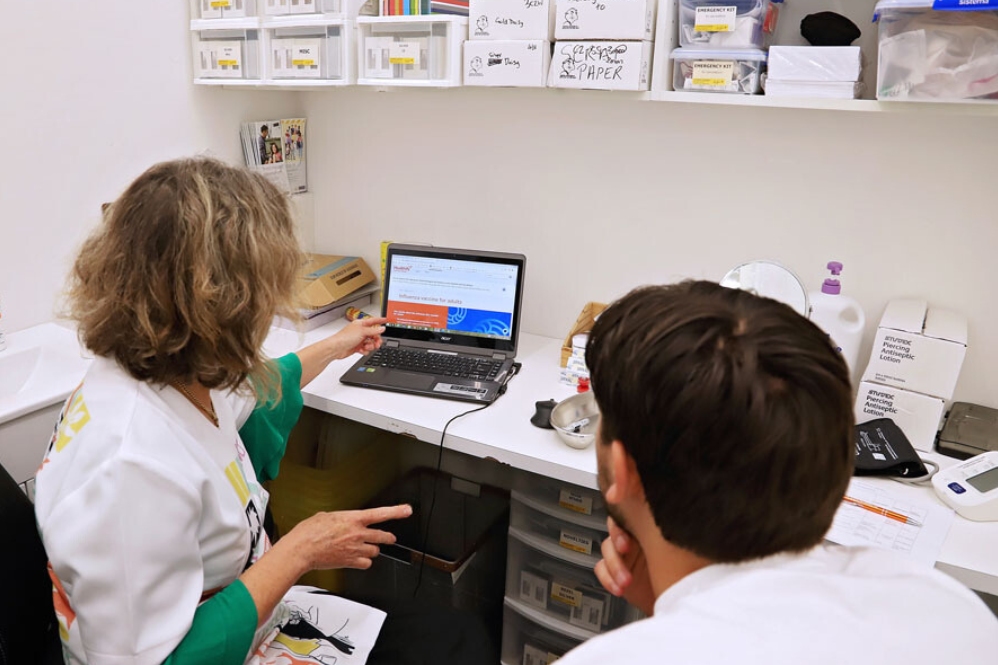Nintedanib
Sounds like 'nin-TED-a-nib'
Key points about nintedanib
- Nintedanib is used to treat a lung disease called idiopathic pulmonary fibrosis. It helps to slow down the development of scarring (fibrosis) in the lungs.
- Nintedanib is also called Ofev.
- Find out how to take it safely and possible side effects.

Nintedanib is a medicine used to treat idiopathic pulmonary fibrosis (IPF). IPF is a condition where your lungs become scarred and stiff, making it hard to breathe. It can also be used for some types of lung cancer in combination with other medicines.
Nintedanib is an anti-fibrotic medicine, which slows the process of scarring in your lungs by reducing the activity of your immune system.
Nintedanib won’t cure your lung condition or reverse any existing scarring, but it can slow down the development of the condition. Therefore, once you begin taking nintedanib, you may not “feel” different because nintedanib doesn't treat the symptoms of idiopathic pulmonary fibrosis and can't reverse the scarring already in your lungs. Read more about idiopathic pulmonary fibrosis.
In Aotearoa New Zealand nintedanib is available as capsules, which come in different strengths – 100 mg and 150 mg.
- The usual dose of nintedanib for idiopathic pulmonary fibrosis is 150 mg twice a day.
- Always take nintedanib exactly as your doctor has told you. The pharmacy label on your medicine will tell you how much to take, how often to take it and any special instructions.
- Timing of your doses: Nintedanib is usually taken 2 times a day. Try to take your dose at the same time each day, in the morning and evening, about 12 hours apart. Nintedanib is best taken with food, at breakfast and dinner.
- Swallow your capsules whole with a drink of water: Don't open or chew the capsules.
- Missed dose: If you forget to take your dose, take it as soon as you remember. But if it's almost time for your next dose, take your next dose as usual. Do not take a double dose to make up for the dose that you missed.
- Keep taking nintedanib regularly: If your condition gets worse despite taking nintedanib and your lung capacity falls by 10% or more within a year, the medicine will usually be stopped.
Here are some things to know when you're taking nintedanib. Other things may be important as well, so ask your healthcare provider what you should know about.
Allergies
If you are allergic to peanuts or soya, let your doctor know. Nintedanib capsules contain soya lecithin. If you have an allergy to soya, don't take nintedanib. If you have an allergy to peanuts, take nintedanib with caution. Although nintedanib doesn't contain peanut oils there's the risk of a cross reaction and a few people with peanut allergy may also be allergic to soya.
Tests and monitoring
While you're taking nintedanib, you will need regular blood tests to monitor for side effects and to check whether the treatment is working. Blood tests are very important during the first few months of treatment, but over time they're needed less often.
Other medicines
Nintedanib may interact with some medicines and herbal supplements, so check with your doctor or pharmacist before starting nintedanib or before starting any new medicines, including those you may buy over the counter.
Pregnant
If you become pregnant, tell your doctor immediately.
Like all medicines, nintedanib can cause side effects, although not everyone gets them. Often side effects improve as your body gets used to the new medicine.
| Side effects | What should I do? |
|---|---|
|
|
|
|
|
|
|
|
|
|
For more information on side effects, see the Medsafe consumer information leaflet Ofev(external link). |
|
Read more about medicines and side effects and reporting a reaction you think might be a side effect.
The following links have more information about nintedanib.
Ofev(external link) Consumer Information Sheet, Medsafe, NZ
References
- Nintedanib(external link) New Zealand Formulary
Brochures

Medicines and side effects
Healthify He Puna Waiora, NZ, 2024

Health Quality and Safety Commission, NZ, 2019 English, te reo Māori
Credits: Sandra Ponen, Pharmacist, Healthify He Puna Waiora. Healthify is brought to you by Health Navigator Charitable Trust.
Reviewed by: Angela Lambie, Pharmacist, Auckland
Last reviewed:





